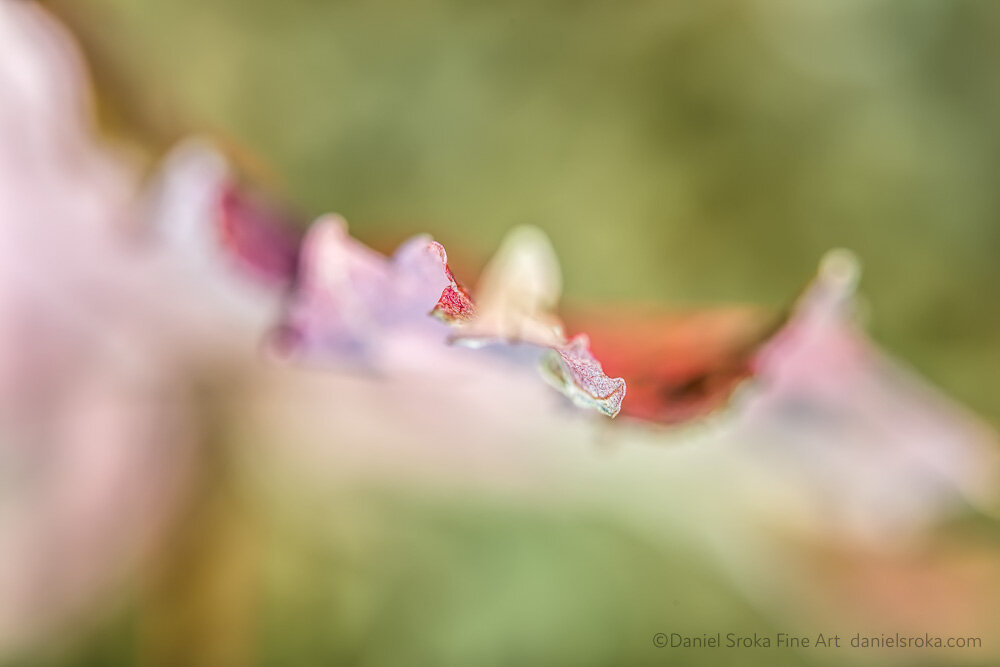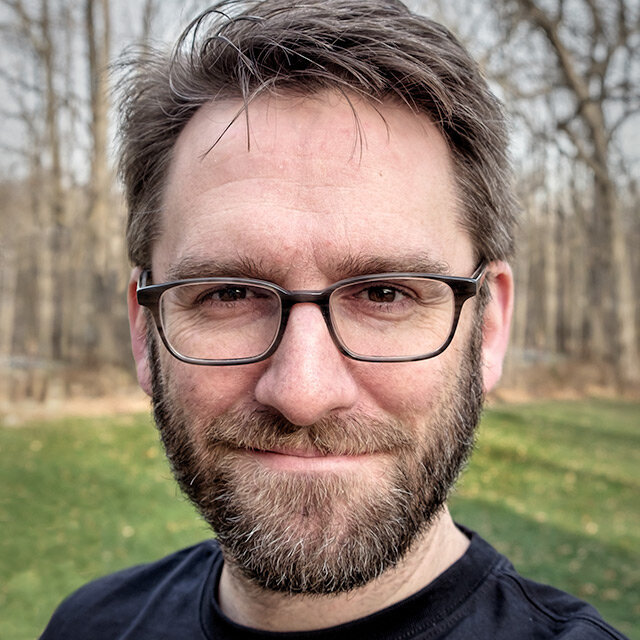Daniel Sroka’s art helps grow the seemingly insignificant, common experiences we regularly have in nature into something deeper and personal. His work is truly incredible. Daniel and I sat down a few months back and spoke about his process and the business of creativity.
Experience Daniel Sroka on:
Additional Information
View Daniel’s work at: danielsroka.com
November 2021: > WATCH Daniel Sroka speaks about his new project Litterfall Gallery. Litterfall Gallery is an online gallery that explores our everyday relationship with nature.







Transcript
Ricky (00:00): Dan, why don't you tell me about your photography that you're doing right now?
Daniel (00:05): I am an abstract nature photographer and I specialize in working with everyday parts of nature that you encounter. Leaves, sticks, ice shells just the small pieces of nature and I create abstract work from those.
Ricky (13:39): Where do you do most of your photography? Do you do it, do you go on trips to take photographs or is it just wherever?
Daniel (13:53): It's mainly in almost everything I work with is within my backyard or my, my town or just just usually I, the subject I find are when I'm walking the dog or you know, well the kids are older now, but when they were younger waiting for the bus always found stuff while we were waiting for the bus. I do a lot of work with melting ice and all of that is the ice that forms on my, on my deck and the railing on my deck after an ice storm, you know, little, little icicles form.
Ricky (14:26): Isn't that interesting that you are able to find the beauty right where you are. And I think that's just such a metaphor for life, people always looking for like happiness outside themselves and for like grander things to feel a sense of completeness, happiness. Whereas you know, a lot of it is kind of just like a little bit paying attention to what's in front of you and being grateful. I kind of see that when you say that you are creating like this beautiful artwork from icicles on your back porch like that. That's what I think of. That's a, that's a fun one too.
Daniel (15:06): You're right. And the ice is fun because it's a it's a, it's a hassle. It's nature inter interfering in your life and, and usually in a negative way, you know, the ice storm, you know, you're, you're kind of trapped for for the day as you know, until the salt trucks come and help melt it away. But it's something where you can step outside. And I, it's funny cause it's, it's also like a little nerve wracking because, you know, it's very slippery and I usually don't work outside and it's, it's a little dangerous. Sometimes it feels like a slip, you know, drop my camera, break the lens and all that, you know, I'm like at these weird angles. But you know, the work that comes out of it is worth it. And most of the other work I do, like I said, I don't work outside, which is ironic.
Daniel (15:51): I work with nature, but I, I bring it all inside. And that's, you know, it's sort of the, I used to do this, you know, live outside and work with it and it's challenging. I'm working at a scale where a tiniest puff of wind and everything's moving and I can't see it. And so I have I have, it's a strange relationship where I'm dealing with sort of the, the, the, the chaotic nature of nature. But that's an interesting way to say that. And I'm trying to put some control onto it with my lighting, with my, I have a lot of these little clamps and clips so I can pin things down and hold them very carefully. So it's nature in an artificial setting. Yes, I'm, am, I'm well, and it's, it sort of comes back to the nature of of perception and sight.
Daniel (16:41): So when we, when we look at things, what our eyes are really doing is getting, is getting very small snapshots at there that the printed together almost like film, you know, you're not seeing really continuous, you're focusing on this point, then you're focusing on something closer. Your eyes are darting all over you. Just as we go through the world, just as we go through the world, our regular vision and when you look at something like you pick up a leaf and you look at it, you're like doing these little snapshots of what you're seeing and you're assembling them together to form the image of the whole in your mind. And so if I was just working with leaf and trying to capture a picture alone, it wouldn't actually look right. I think it wouldn't really represent what your mind is seeing. So by actually holding it down to really taking that moment to kind of focus on something, it's sort of the, the, it's a, it's an artificial way of pausing perception for a second and saying, here's this one element that normally get a glimpse of it.
Daniel (17:36): I'm trying to give, take more time to really see deeply. Could that make sense? Okay. I hope so. It's hard talking about the process that you just do intuitively. It's hard to put into words, you know, just what you were, your reaction. You know, I see something and then I start to, it becomes a muscle memory almost of how I moved the camera, the lights and how I just work with that leaf and my camera where I have to stop myself and be a little conscious of like, wait, what, what am I doing here? Cause I'll just get into sort of this automatic dance with it where I'm kind of rotating this, I'm, I'm adjusting the position of the light, trying to get a shadow a certain way. And you get into this, this, this just this motion. And, and it's, it's it's very instinctive.
Daniel (18:29): And then outcome something and then you stop and go, Whoa, that was good. I liked that. How did I do that? How did I get there? It's like, it's like walking through the woods and you just not paying attention and you find yourself somewhere. They go, wait, how do I get here? How did I get here and how do I get back if I want to? So that's a lot of the challenges is like some of the, some of my best pieces, I'll see a pickup, a leaf, see it, know what I wanna do with it and just just an instant and then do it and then later go, I want it. I want to adjust that. I want to do that a little bit differently. And then I have to find my way through that path. Back to that spot.
Ricky (19:05): We're here at the SCA conference, So you are talking to people that are looking to be self employed in the arts and you spoke to, you spoke to them yesterday. Is that accurate? What's the general message? Are you doing one-on-ones or are you doing like, did you do like a presentation type thing? No
Daniel (19:28): Presentation yet. Not ready for that. I did. I, I've been on panels and one-on-one conferences and you know, round table where five or six people sat with me and we talked.
Ricky (19:36): Okay. What is your general, what like what are you bringing to this conconference? Like at a high level, Daniel (19:45): The basics is whenever I meet somebody who's an artist who wants to make a living the first thing you have to understand is art. It might be a calling, it might be a lot of people when they get into art, they get into it because they love this idea of it's something different from the rest of the world. You know, you, you, you've been called to do it. It's a, it's a talent. It's, they, they, they enjoy that sort of specialness of it. Sure. But if you want to make a living from it, you have to kind of bring in the, not the dirty nature, but the, the, you have to bring into the business side of it. Of course. And I find that, I've talked to a lot of artists and some people get that immediately go, okay, I understand this is a, it's a business.
Daniel (20:32): And some people have a hard time accepting the idea of that their art has to be thought of as a business. And so a lot of what I try to talk about is just embracing this idea that yes you an artist, but learn the language of business. Because if you want to make money, you have to from it. If you want to make, well let's stop a second. If you want to make a living being a creative person. So if you want to do this for your livelihood, you need to make money. Unfortunately to make money you have to have a business. And a business is just a series of tools, language. It's, it's a, it's a metaphor almost that you can embrace to help take your art and use it to create this livelihood. So it's not something to be afraid of. You're not selling out any of those things that people kind of come up with.
Daniel (21:21): You know, the musician who does a jingle for a, you know, some business and ah, he's sold out was like, no, he was smart. He made some money. He has talent, he used it. And now he can continue to make his music. It's a, it's embracing it. And at this conference is great. Everyone here, they signed up, they know, they hear about being self employed and so everyone's very much into that. And it's just kind of explaining what that means. Cause sometimes it's a little tricky. So you know, your art is if you think about it, it's a product and you're your collectors as you say in the art world, their customers, a gallery, it's a store, you know, and if you start, and the interesting thing about it is using the language of business, it starts to puncture a lot of the scary, pompous difficult parts of the art world.
Daniel (22:08): Like as an artist, you're told, Oh, you have to get a gallery to represent you, you need collectors, you need all this stuff. And it's a very intimidating thing. And no, it's a store and its customers. And what's there think of it that way. It's like, Oh, okay, well how do you reach a customer? Well, you, yesterday we were talking about how do you market your work? How do you brand yourself? And you could see an artist kind of cringing. Oh, I don't, I'm not a product, I don't brand myself. But all branding uses. How do you talk about your work and how do you talk about your customer? How do you, how do you introduce your work to them in a way that's relevant to them so that they understand it?
Ricky (22:45): Do you think that this whole idea of thinking of what you do as a business like that, that seems intuitive to me and, but I do find that some people in the, this new creative art world that I've recently kind of got into, I do feel that there are some people that aren't, I don't, I don't like marketing myself. And that seems so strange to me. It seems so strange because if you were doing anything else, you would, it's understood that you would have to market yourself. Right? So do you feel like that is a, in the creative world that, that, that that is a specific place where there is pushback on that?
Daniel (23:36): I think, I think so. I think a lot of times people get involved in the arts and creative work because they don't want to deal with the businesses world. They're turned off by it and there's a lot to be turned off. If you think about business in general, it can be, it is there, it's easy to point out to negative examples of businesses are. And I think there's a reaction to that. And I think some of it is the culture also of art and have creative spaces where there is often a just this, this embrace of this image of your separate from the, the, you know, the mercantile nature of society. You're, you're, you're, you're not a hermit, but you're, you're just separate from it and you're able to rise above it. And I think some people get really attracted to that identity.
Ricky (24:32): Yeah. This reminds me, I just had this idea that came into my head because I went to school for engineering and when I graduated most obviously most of the kids that I was in school with, they were pursuing engineering roles. I was pursuing a sales and marketing role for whatever reason. But to me, I'm realizing it's kind of the same thing. I'm thinking like if you just want to be into science and you just get a job as a research scientist, I don't want to fuss with the business part. Right. It's kinda the same.
Daniel (25:04): It's the same thing. Yes it is. You're right. That's a good, that's a good point. That it is just that nature of, of did pure creative and engineering being creative act as well. Like anything where you just want to focus on the, the making of something as opposed to the, you know, the business side, which is the selling and the marketing.
Ricky (25:25): And when I was in internet consulting I worked at for big like agencies where we would do, you know, e-commerce projects and we would have, you know, creative people. I would work with visual designers and copywriters and a lot of those they were all very young, but they weren't interested in dealing with the client or dealing with anything of that. They wanted to, you know, many of them would, but some of them were just focused on, and even the developers that I worked with, they were just focused on the development. I don't want to talk to the client, so I'm realizing it's actually is all kind of the same thing. But when you're an entrepreneur as an artist and you're creating you know, assets, creative assets that are, that you make yourself, you can't, it's another, that's another thing because you have to find a way to sell it.
Daniel (26:15): Well, the challenge I think, yeah, I've worked with a lot of coders and yeah, a lot of them, they didn't want to give me the problem to solve and I will solve it and they want that focus. The advantage of being a coder or being an engineer is there's, there's industries that are designed to allow you to do that and be successful and make money and have a career. There is a job path home or being a coder where you just code and that's, that's much more difficult for the art space. It's very hard to find a place where I just want to paint. Great. We'll pay you, you know.
Ricky (26:52): Well, unless, unless you're in a, you work for Disney world. I was just there and they had a lot of, they had a lot of stuff in their parks that I'm thinking these are creative production jobs probably great, great. They probably don't make a lot of money. But they were, they were huge murals. I went in the Mexico pavilion in Epcot and they had all of this hand painted stuff in this row. It was like a boat ride. And I'm like, this was an amazing job for someone who was someone who went to art school and it must have been incredible. And there was all kinds of stuff like that. But I don't know if there is a lot.
Daniel (27:35): And she is, this is the, this is the part maybe where the artist way of thinking is different from engineering or from coding in engineering or coding or I, I did graphic design as my first career. You know, you can't really do graphic design just on your own. You could, but you really need a project. You really need someone to hire you. And, and, and of course give me a problem to solve a problem solver. You're solving a business problem. Art though is, is an individual exercise you're creating. The ideal form of art is you go off and you write your novel, you paint your painting, you do your work in isolation. And it's purely a work of creativity from your mind. And that's sort of the, the allure of it where you can do that. So even if you went to work for Disney or movie production you know what a studios down in New Zealand, you did the Lord of the rings movies, you watched the videos on those artists.
Daniel (28:26): It's someone else's vision. It's, you're working towards someone else's vision. They are amazingly talented, but you have to sort of say, I'm going to work for someone else. And a lot of artists don't want that. The interesting thing about that is that is exactly the mindset of an entrepreneur. I want to create something myself and work and do it. I want to make the rules about how I make it, how I sell it, everything. So there's a lot of parallel between many artists and an entrepreneurial mindset that once the artist sees that it gives them a path to be creative, be that isolated individual creative force and then actually find a way to make money from it. There what you have to get over is the purity of your work. I'm sorry, I'm using air, I'm using air quotes there. You know, you have to get over the idea that your work is somehow separate and special and should not be solely by commerce.
Daniel (29:28): And this is where there's an industry out there that kind of feeds on that. And that's the usual art world where, Oh no, no, you must be represent. You must be chosen by a gallery. You must be represented by the gallery, which is a word. Collectors much recognize your genius and then you're successful. It's, they're buying, they're selling. And once you actually learn about the art world and how the prices are artificially inflated by collectors in, and just, it's a, they are very much a business about money, yet they isolate the artists from that and it kind of make it feel like you've been invited in and it's a special thing. But once you realize you're, your art is going to be sold at some point in some way, it's going to be traded for money or it's going to be bartered for food.
Daniel (30:14): Whatever you're going to do, you can need to let someone else control that or you can take control and then find a way to do it. And what I love about that is I find just as much creative challenge in running my business as I do in making the art. How can I find a way to sell this? How can I find a way to market this? How can I make a business that's interesting and just as, as exciting for me to do as my artists? And that's when you do that. I mean it's, it's great. I, I spent you know, this past month I spent a lot of time working on my contact database. You know, all my list of all the people I, I market to and reach out to and just coding the back end of my database to make some tools for myself to see who I need to reach out to, who hasn't responded in a while, what materials I've sent to who and you're having fun with them, loving it.
Daniel (31:01): I learned, you know, I learned some new new techniques and some new tools. I just read a book about writing business plans for retail stores. I was visiting a store and I loved how it ran and I was like, gosh, that must be an interesting business. And I found a book and it was just fascinating to learn about the challenges of like, how do you create a store that attracts people, that, that sells the product, that it's a, it's a puzzle and it's just fun. There's aspects of business which are very involving and very, you know, very exciting to pursue. And so as a creative person, if you can sort of embrace that side, it's very powerful. And that's, you see some artists who can do it and it's like they just do some amazing things.
Ricky (31:45): Yeah. What I'm hearing is a sense of curiosity really about the world is what you're, is what you're saying, not just about the leaf that you're taking a photograph of, but a curiosity about how everything works. And I agree with that. That's why I did this podcast, you know, eager to know. I'm a curious guy. Right. The way I came up with the name of the podcast was I'm like, well, what's this all about? I'm like, well, I'm curious. So I Googled curious and the definition was eager to know and that's the name. But I, the reason why I mentioned that is you know, that's the reason why I started this because I want to find out other aspects of what's, what am I doing in this art world? Well, I need to talk to other creative people and you know, and let me find out what's going on in their head because I want to know about it, but it's also going to affect maybe my artwork, but how I think about me as an entrepreneur and entrepreneur. Exactly. And did I just invent that
Daniel (32:40): Word? I don't know. I know I've seen it before. Sorry. No, and it's, and I love I came to this event because I, the more I talk to people and more, I talk to other artists you know, everybody has great ideas and they might not realize how great their idea is because they don't know the context of it. You know, I was just talking to somebody and he suggested an idea for my, my work and I was like, Ooh, that's great. You know, and he's an art student, the other third year art student, but it just, something popped into his head. He, you should try doing this and, and you can just learn. There's so many opportunities to learn. And like, I don't claim to have any answers. Like I know what I've done and man, I got to get a lot better at it.
Daniel (33:22): I mean, there's just running this business is going to, this is no end. There's not going to be point where I've solved it. And then, cause even when you get close, the world changes. The internet changes things, people's relationships to art change. It's just a, you gotta be comfortable with that. You're always going to be frustrated. And I, when I started way back you know, I started messing with computers when I was a kid. I got into graphic design partly because this was the desktop publishing revolution which I dunno how many people remember desktop publishing as a term, but it was changing the nature of design and that whole industry. And I knew how to use computers. They knew how to do design in a traditional way. And I went and you know, as a very junior person working for a printing company and just, they needed to do this, Hey, how do we do this on the computer?
Daniel (34:13): And I'd be like okay, let me figure it out, figure it out in the software. And then they would teach me why while I was like, why are you doing that? And like, well, this is why you need to do it. And you know, so I quickly transitioned from using, you know, mechanical pens and exact and knives to doing whatever I could on, you know, the old Mac and the laser printer. And so this is a whole nother podcast episode, but, Oh no. But I would love to hear all about that. That's amazing. But it's that, it's that curiosity of break out. I don't know where I'm going with that. Know that it's cure, it's you're giving a problem and solving it and being curious about how to do something new. And it's, that's what I was because of the industry, the change.
Daniel (34:56): So getting a design, there was a big change with computers towards us publishing. And then few years later the internet happened and the change happened again. And then with the internet coming, it's been several big revolutions of how people interact and how they deal with it. Oh, at the beginning in the early nineties, mid nineties, it was, Oh, people will never buy online. People will never you know, have, you know, online dating what a joke. People never going to do this. And nowadays social media, it has a main way people interact and of course people buy online. It, you have to be able to adapt and change all these things and that's, that's where challenge comes in. Nice.
Ricky (35:39): Can you give people that are listening to this, a couple of tips on I dunno, 10 tips. I'm going to leave, I'm going to leave it open. Who would this be for? For artists? This is people that are, look, so my, the person that I am envisioning listening to my podcast customer, my ideal customer, my ideal listener is someone who is looking to embrace the creative part of their brain to explore their creativity, whether in a small way or whether it means they want to stop being a lawyer and start doing something different. Right? But someone who is looking to tap into that part, right? Right. Themselves.
Daniel (36:19): I would say the first thing is don't want to assume you have to do things in the traditional way. If you're a painter, don't assume you have to do the gallery path or, or be in con, be in, in, in shows and winning competitions. Make no assumptions about that. There are, those are paths that have worked for some people in the past. That doesn't mean it's the only path forward. So be it, it doesn't mean that they're not bad paths. They could still work. Some people make total careers out of the traditional art art business side, but be open to new ideas and be open to explore the new paths and be open to using whatever tools and language you have. So if you're a lawyer in your current life and you want to switch over, you have a lot of experience and a lot of, of, of mental training and use that you know, try to find a way that you can use that either the relationships you've made, the knowledge you've gained or the, the, the, you know, your, your, your mental agility that you've learned or something there.
Daniel (37:27): And don't be afraid of thinking of it like you're starting a business. It actually, the language of business, the metaphor of it is so powerful because it gives you a way to think about what you're doing. That's a little less intimidating if you, if you go to someone, say, I'm quitting my job. I've been a lawyer, I'm going to go and be an artist. You know, people are just gonna roll their eyes and Oh my God, it's very hard to say that. It's a very difficult thing to say. I'm going into the business of art. I'm going to go start my own business. Really interesting. People are suddenly much more supportive. What are you doing? Well, I you know, I love photography. A friend of mine, he's a he was a pharmacist for many years and he discovered a love of photography and wanted to do portrait photography.
Daniel (38:08): And so he made that transition over and he found a way to create a business to support that new endeavor. So it's, you know, don't, you know, use that as a tool to help you kind of framework frame your work. And the great thing also is once you start thinking of as business, Oh, the resources that are out there, you know, you can learn. Now you can go to some and say, I have, I have a question. I need to find my ideal customer. How do I do that? There's books, there's classes, there's, if you just say, I'm trying to, Oh, I need collectors for my work, you're not going to get much help. It's harder to find those answers. So I embraced the business side. It's, it's powerful. And once you, once you accept that you're you know, the creative artistic side plus a business savvy, Oh man, you're unstoppable.
Daniel (39:00): I think it's just a, you really are, you know, using all the tools that it's, I think people are afraid of that because they want to keep artists sort of, no, no, you stay over there. You just create, you do your pretty stuff. Leave the business solver here to us because it's a way of gaining control and and, and sort of keeping, keeping things the way they've been. And so once, if you're that artist and you start, no, I'm going to start coming over into the business side. I'm gonna start exploring that. I'm gonna know contracts. So when someone's talking to me about they have a budget for a job or they're offering me money, I'm going to go, excuse me, I'm looking at your contract and you're saying, you're taking my copyright. I does not allow it. I do not. Here's my contract.
Daniel (39:43): And it stops them. And the great thing is, it's almost everyone I've worked with once they understand you're an artist, you can talk business. Oh, they love it. Like I get most of my clients, most of my most loyal customers are. They just tell me, it's like, Oh, we, we started working with you because you returned our phone calls, you sent our emails, you gave us prices when we asked you, you give us invoices when we needed them. You delivered the art on time. Just basic stuff. And they say you don't understand how rare that is. So even just showing up and being a professional, you, it gives you a leg up all over so many people, and then you can get better and better and better and improve where you do. Okay. Makes sense. Ricky (40:24): Well, thank you very much. Where can people learn more about your, see your work or learn more about you
Daniel (40:30): Website, Daniel saroka.com danielsroka.com. Okay, great. Well, thank you so much for talking to you. I appreciate it.



